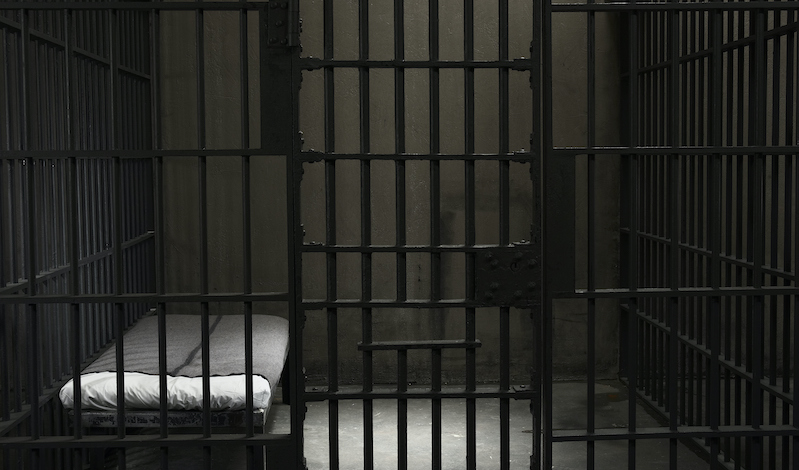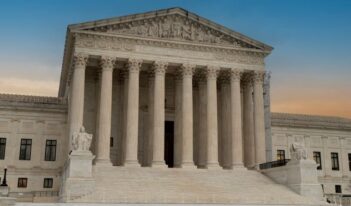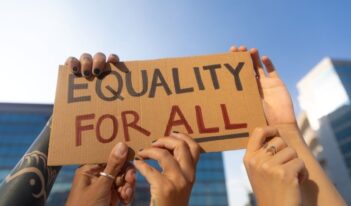
A recent U.S. Supreme Court case highlights death row inmates’ contested religious rights at executions.
Death row inmate John Henry Ramirez had one final request before his scheduled execution by lethal injection: He wanted his Baptist pastor to “lay hands” on him and pray out loud as he died.
But the Texas Department of Criminal Justice denied Mr. Ramirez’s petition. Citing security concerns, the Department said that his pastor had to remain silent and physically separated from him. In September, the U.S. Supreme Court stayed Mr. Ramirez’s execution to further consider the issue.
In taking up Mr. Ramirez’s case for oral argument in November, the high court appeared poised to answer an open question: Does the Religious Land Use and Institutionalized Persons Act (RLUIPA)—a federal statute that protects inmates’ religious rights—extend to the voice and touch of a spiritual advisor when an incarcerated person is put to death?
The Court’s pending opinion in this case, expected by June, may clarify to what extent RLUIPA protects prisoners’ access to spiritual guidance in the death chamber.
In evaluating RLUIPA, no U.S. court—state or federal—has recognized the right of death row inmates to touch or prayer during an execution. And although RLUIPA guarantees respect for inmates’ religious liberty, state regulations often shift over time—creating confusion about what actual freedom inmates have to practice their religion. In Texas, an inmate’s ability to access spiritual advisors in the execution chamber has been a “convoluted” issue in recent decades.
Enacted in 2000, RLUIPA provides “very broad protection for religious liberty.” Moreover, the statute requires courts to apply strict scrutiny to government rules that “substantially burden a prisoner’s religious exercise.” Under this standard, a state’s burden on prisoners’ rights is permitted only if the government can show that it is the “least restrictive way” to further a “compelling government interest.”
As a result, the Federal Bureau of Prisons usually permits “prayer and laying on of hands” as a matter of policy, only barring spiritual advisors from engaging in “disruptive physical or verbal behavior.” In eleven of the thirteen federal executions that took place between July 2020 and January 2021, the Bureau allowed religious advisors to enter the death chamber, pray, or converse with incarcerated people prior to the administration of lethal drugs. In one case, an advisor was allowed to physically touch the person before the execution process began.
But “disruptive” behavior can be ambiguous, and state-level interpretations can change on a case-by-case basis. For example, in the nearly forty years since Texas reimplemented the death penalty, the state has historically allowed Christian and Muslim chaplains to touch dozens of dying inmates while praying aloud. Yet in 2019, the state refused an inmate’s request to have his Buddhist spiritual advisor present at his execution. In response, the Supreme Court granted a stay of execution and ordered the state to permit the inmate access to either his personal advisor or “another Buddhist reverend of the State’s choosing.”
Texas responded to the Court’s order by attempting to exclude all clergy from execution rooms, following an option proposed by Justice Brett Kavanaugh in a concurring opinion in the Court’s 2019 case.
In another case last year, however, the Court addressed a similar Alabama law and suggested that “all people who are being executed, regardless of their faith, must be allowed to have a spiritual advisor present.” In light of this recent decision and several legal challenges in Texas courts, Texas shifted its execution rules again. The state now permits the presence of inmates’ own chosen spiritual advisors in the “viewing room” of the death chamber, but still denies them the ability to touch and audibly pray over the inmate in the moments surrounding death.
Mr. Ramirez’s request came soon after this latest policy change by Texas officials. In denying Mr. Ramirez’s petition, Texas reasoned that “an outsider touching the inmate during lethal injection poses an unacceptable risk to the security, integrity, and solemnity of the execution.” The state stressed that a pastor’s presence could interfere with the medical administration of lethal injections—a method that has led to a number of “high-profile botched executions.”
But as Justice Elena Kagan alluded to during the Court’s recent oral argument in the case, the government produced “not a single example in history” of a spiritual advisor ever interrupting an execution. Justice Amy Coney Barrett also observed that “trying to get to zero percent risk” of a botched execution could mean blocking religious leaders from the death chamber altogether, perhaps ignoring all of the protections promised by RLUIPA.
Four other justices, though, seemed to interpret RLUIPA’s protections as more qualified. Justice Clarence Thomas contended that death row inmates could raise insincere religious liberty claims as a way of “gaming the system” and buying more time. Relatedly, Chief Justice John Roberts asked whether the state may face difficulty in determining whether inmates’ religious beliefs are “sincere.” Meanwhile, Justices Samuel Alito and Brett Kavanaugh expressed worries about lawsuits flooding into the Court. Justice Kavanaugh speculated that if the Court ruled in Mr. Ramirez’s favor, similar suits would “be a heavy part of our docket for years to come.”
Although all four of these justices seemed skeptical of Ramirez’s argument, Justices Alito, Roberts, and Thomas joined the majority in Burwell v. Hobby Lobby, where the Court adopted an expansive reading of religious liberty under statutory law. The justices granted great deference to this right in Hobby Lobby despite fears—subsequently realized—that the Court’s decision would produce a flood of religious liberty lawsuits from companies.
The Court has recognized previously that Congress passed RLUIPA to afford inmates “greater protection” than even the First Amendment requires—calling into question whether judicial efficiency concerns, such as about a potential for a flood of lawsuits, should guide the Court’s reasoning on a matter of religious liberty. This concern rings especially true with end-of-life care, when many belief systems demand the guidance of a spiritual authority.
Ramirez is only one of many inmates whose rights hang in the balance as the Court assesses RLUIPA’s application to Texas law. If the Court had not halted his execution, Ramirez would have been the 573rd prisoner killed by the state of Texas since 1982. At least 197 inmates currently sit on death row in the state alone.
The Court’s decision this spring will decide how broadly RLUIPA protects religious liberty. Until then, about 2,500 inmates on death row around the country lack a guaranteed right to vocal, hands-on spiritual comfort if the state decides to put them to death.



